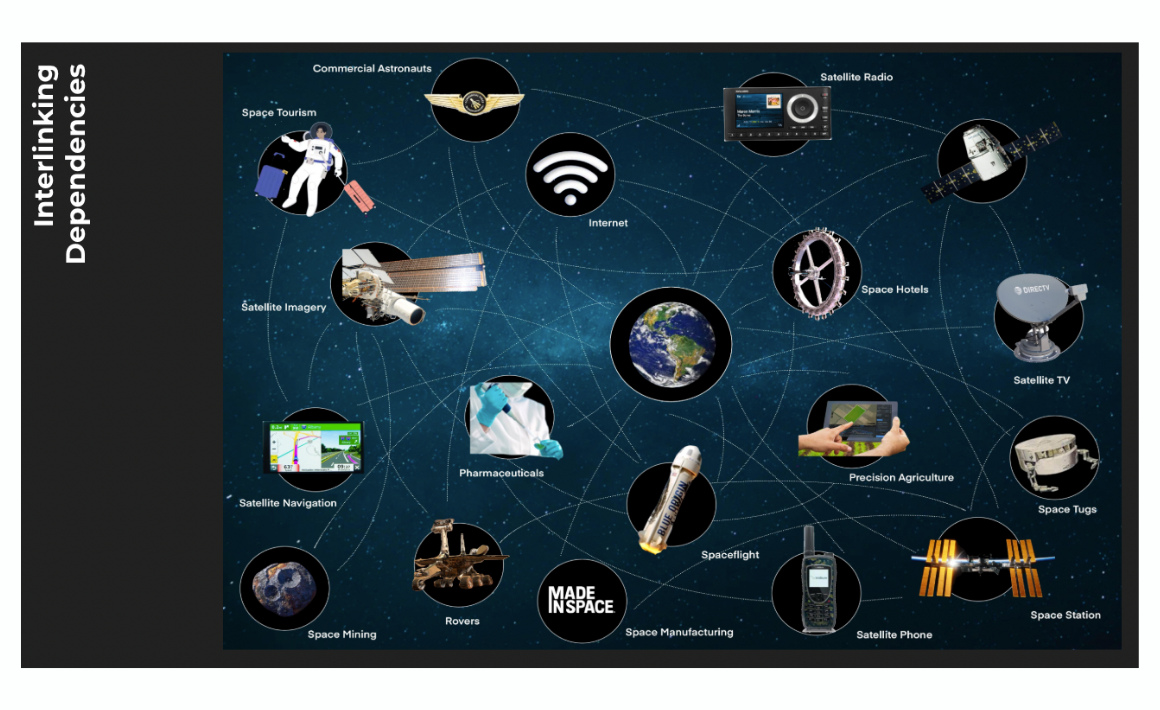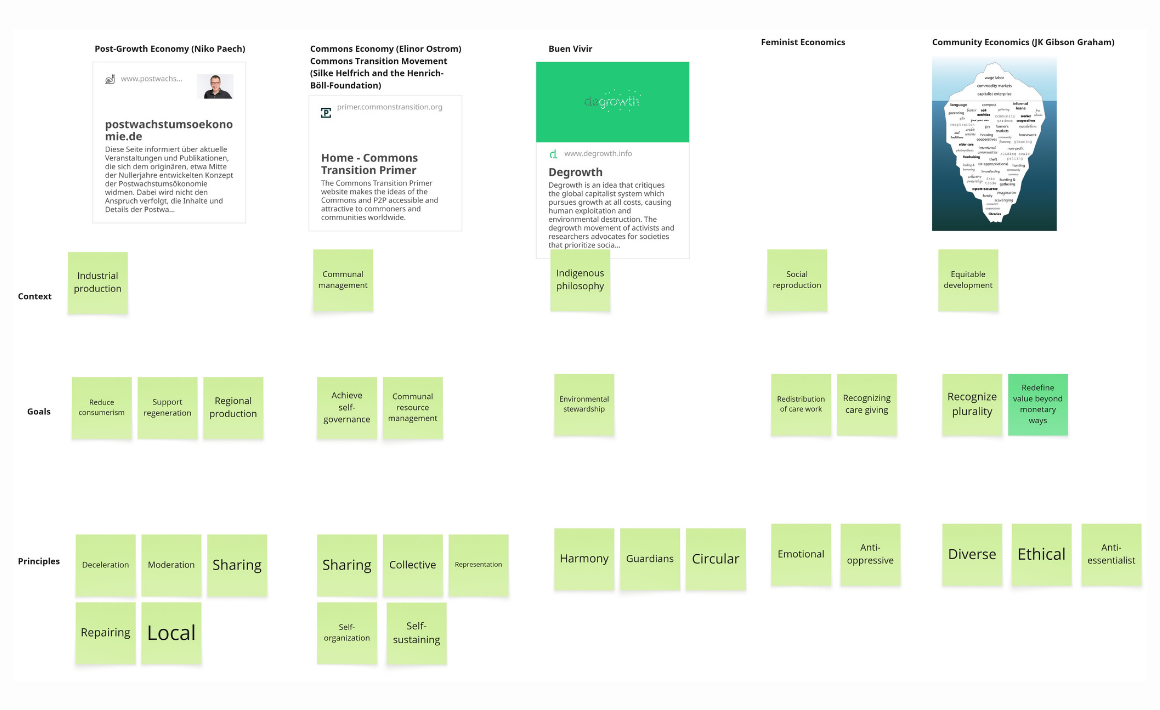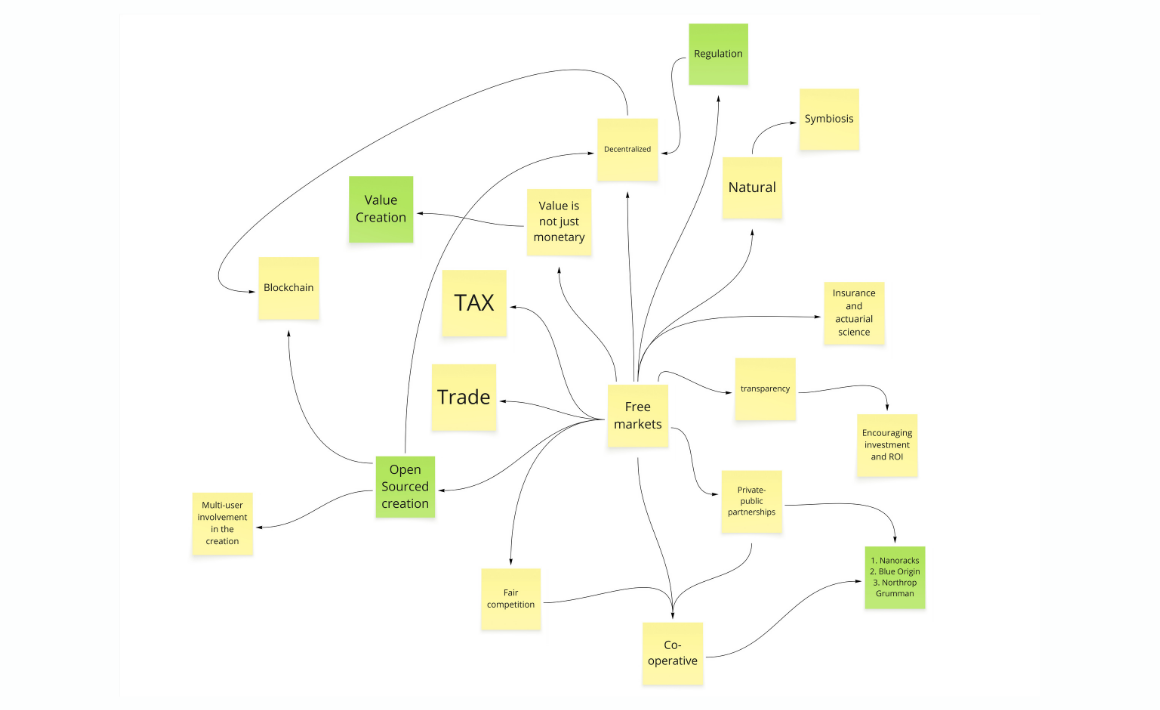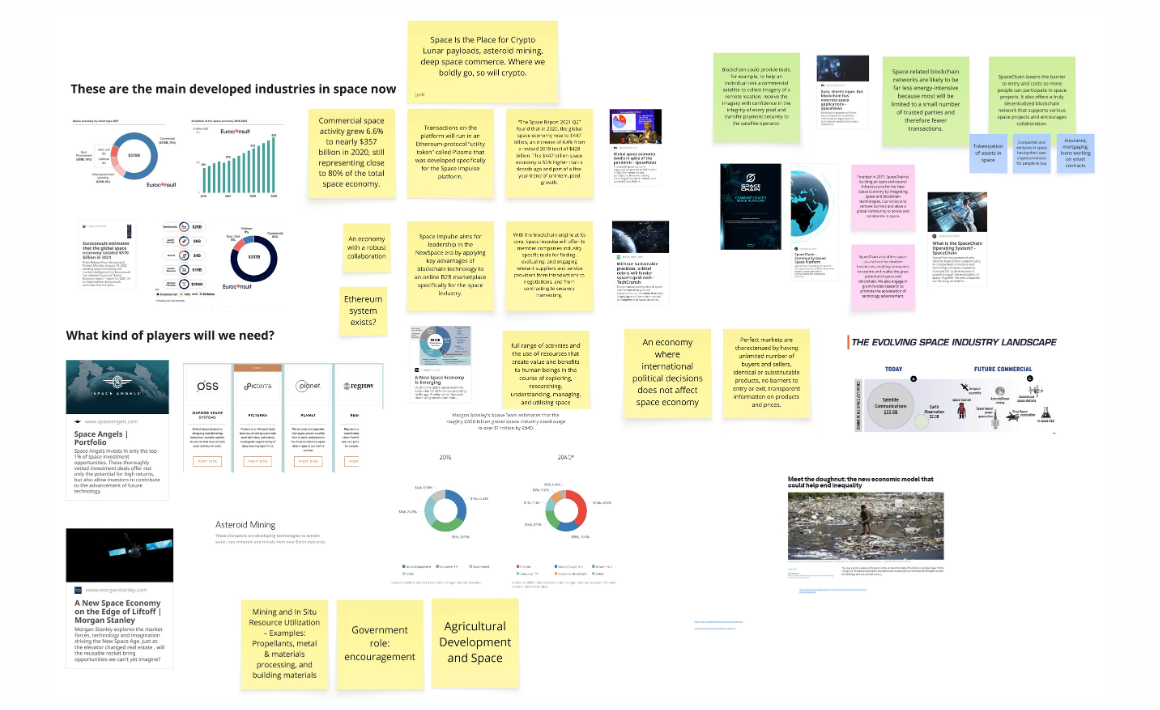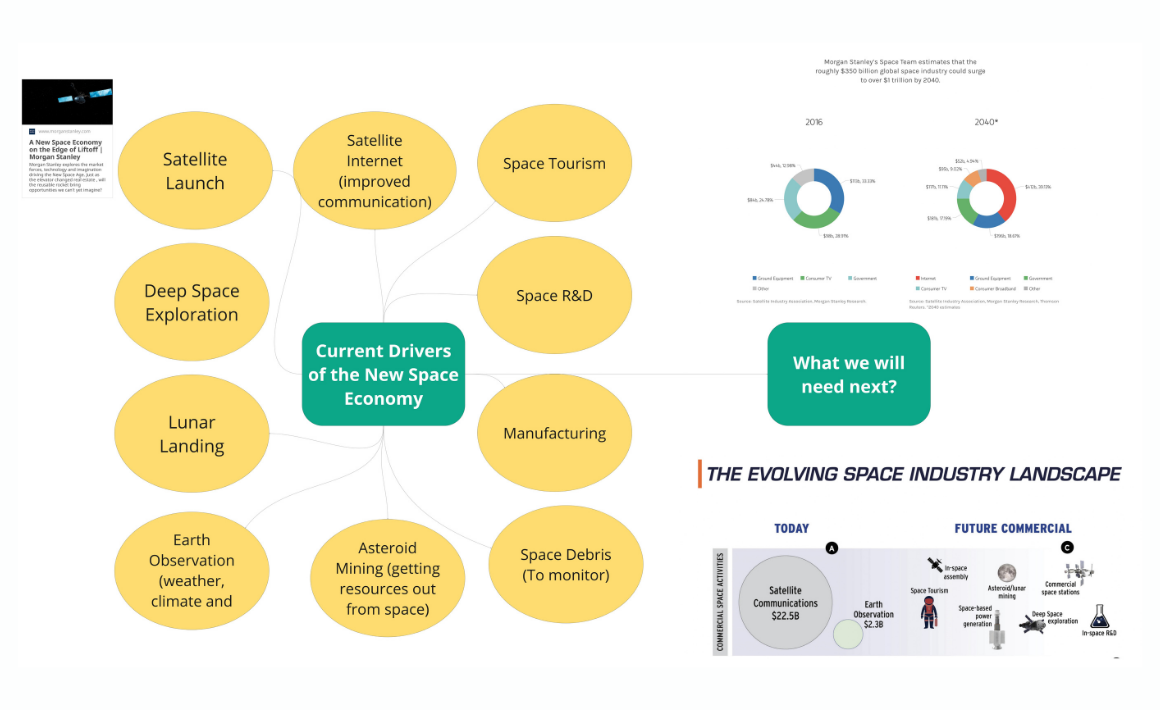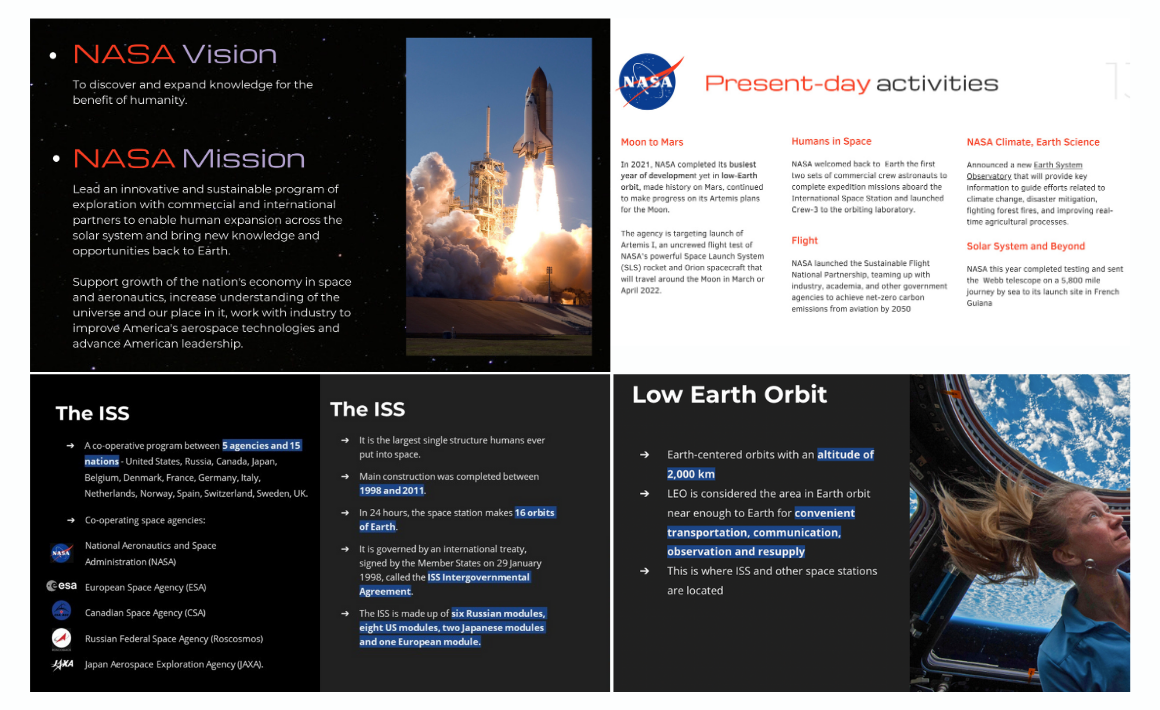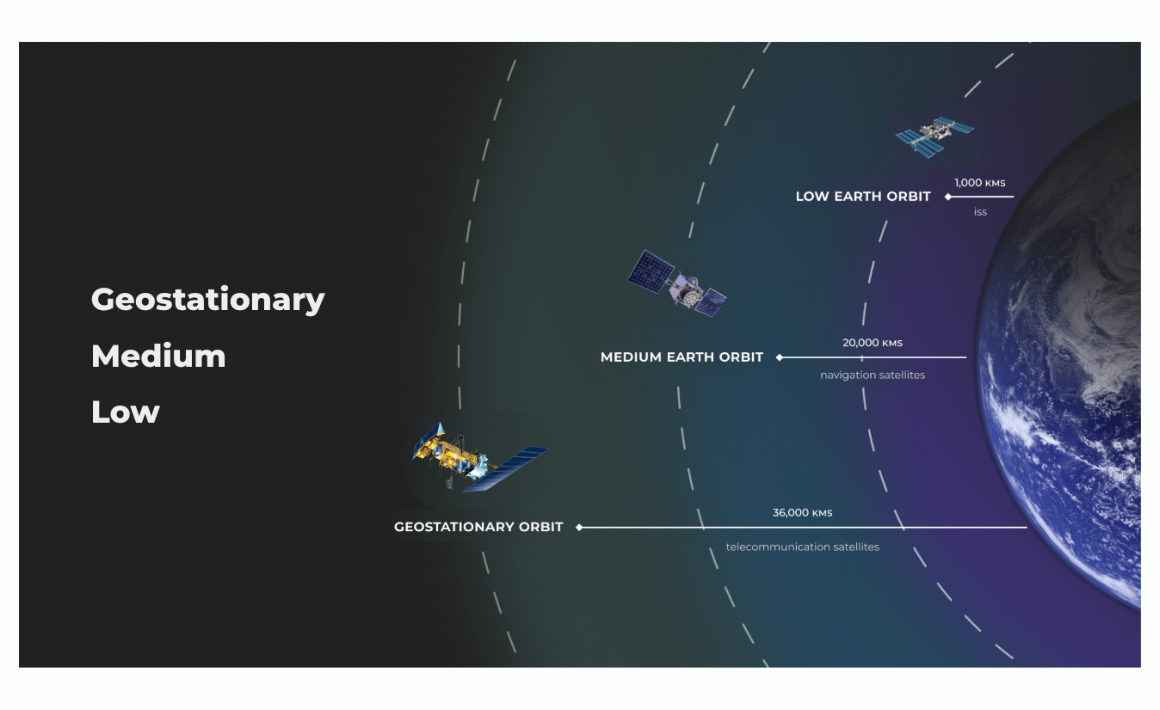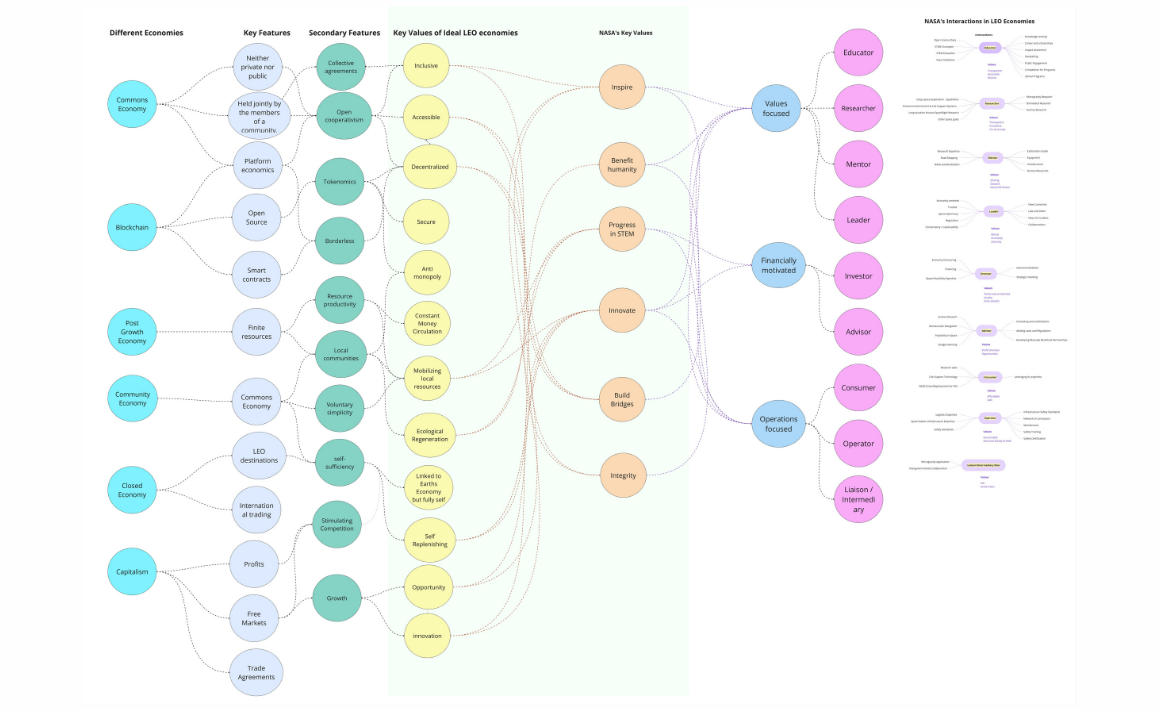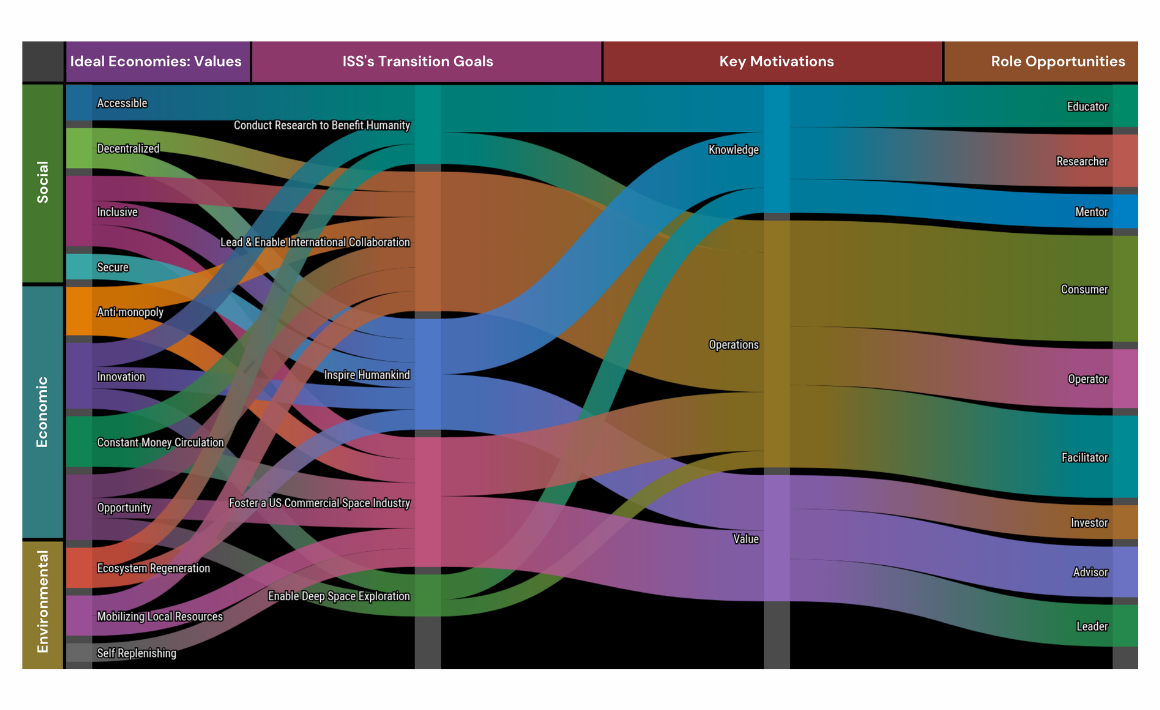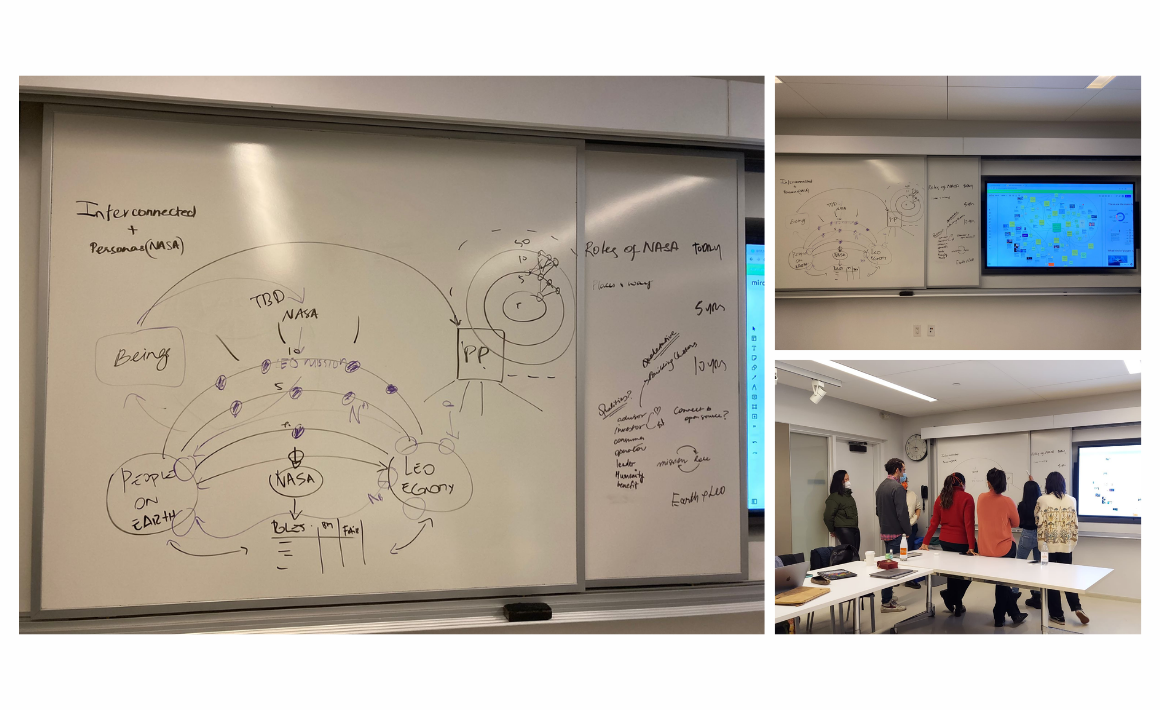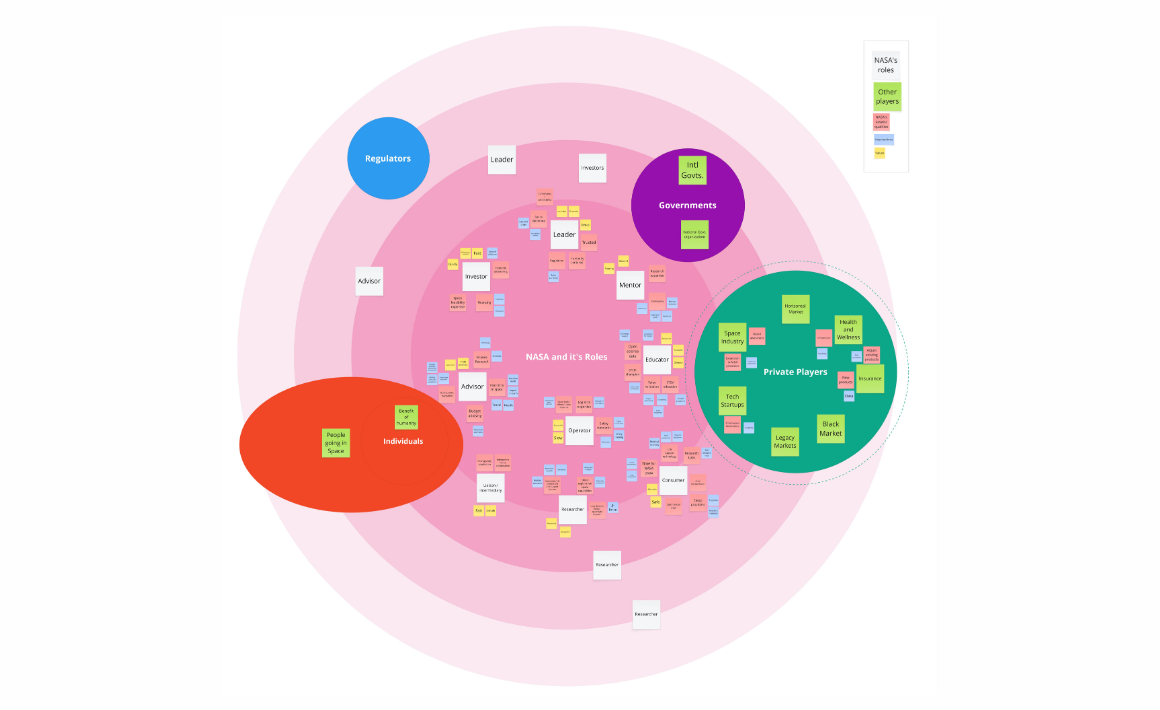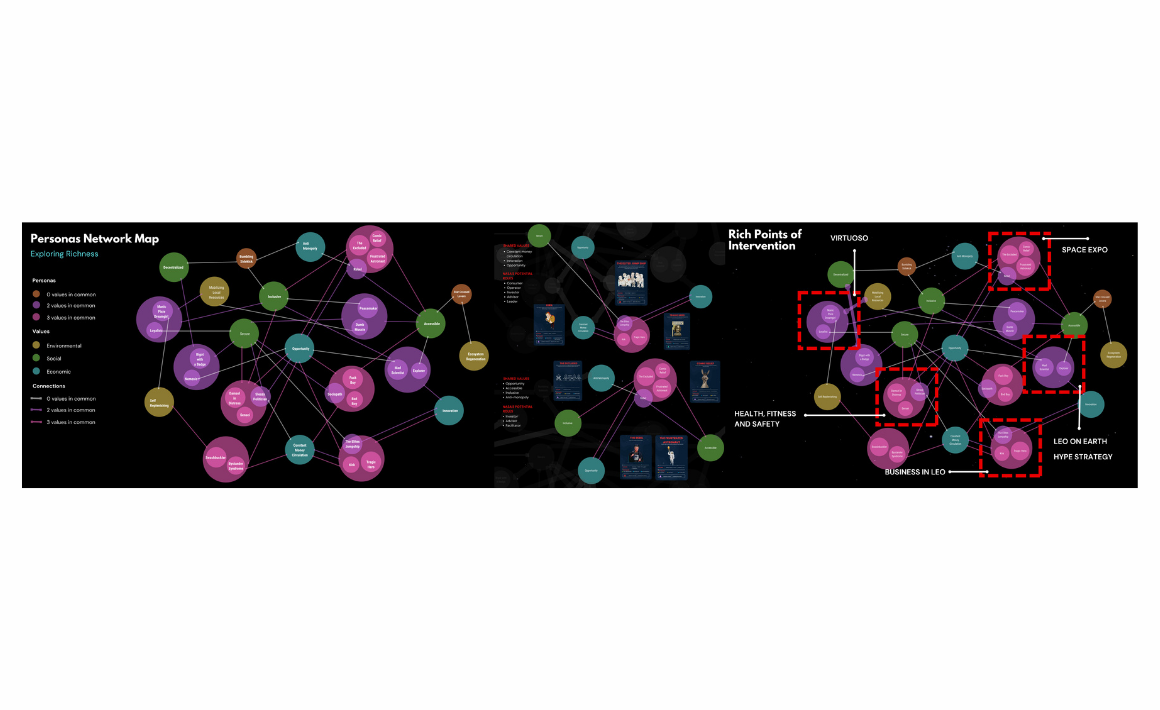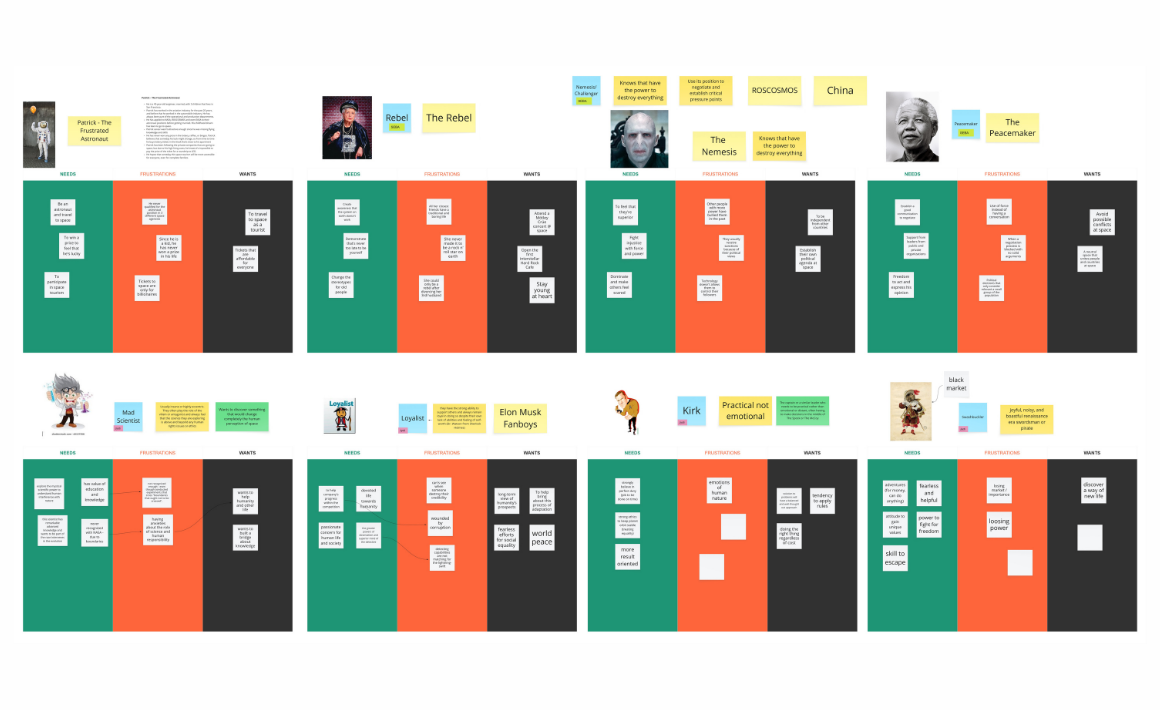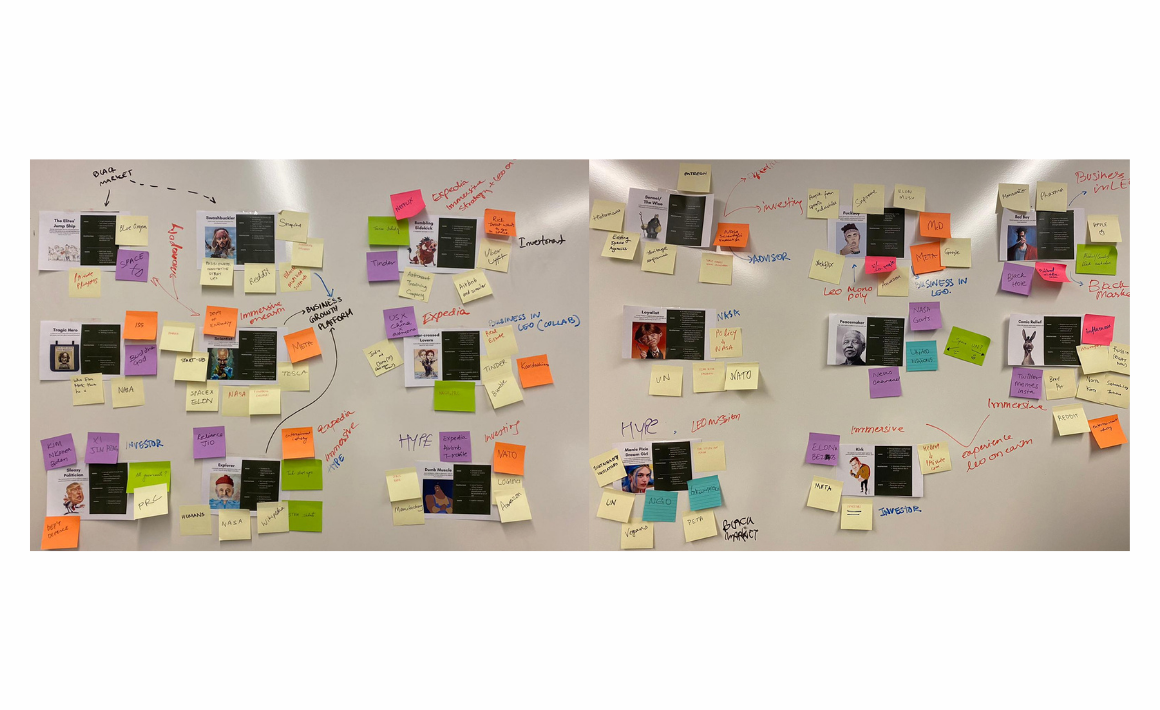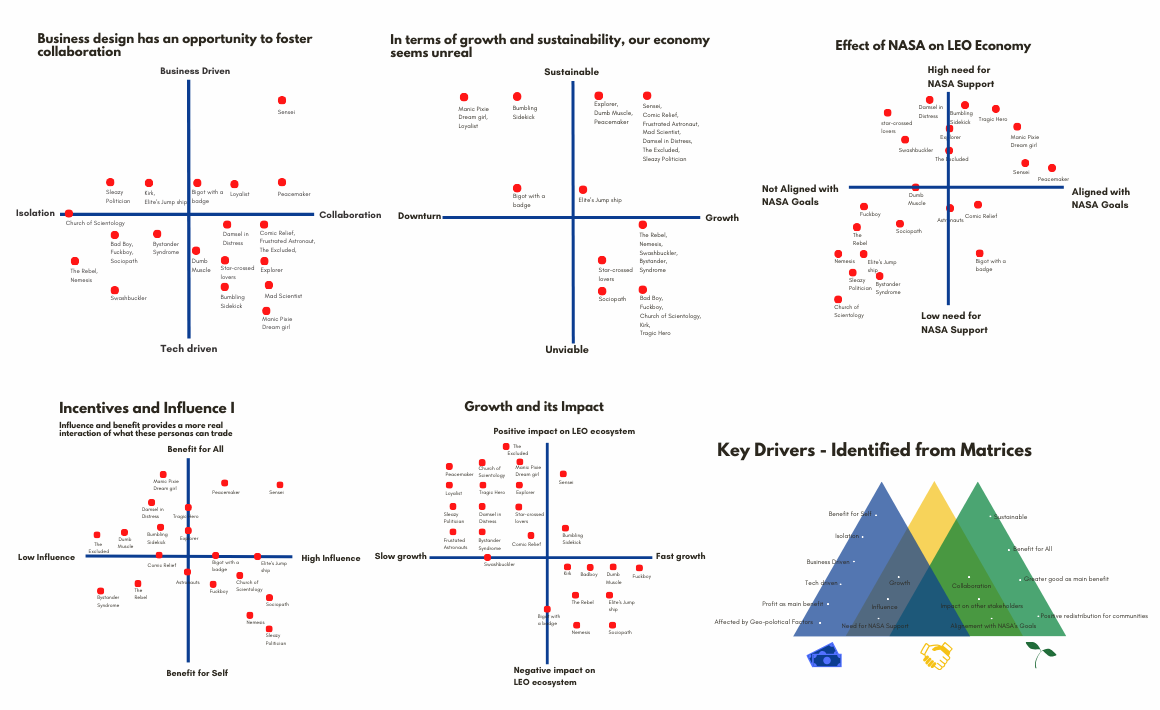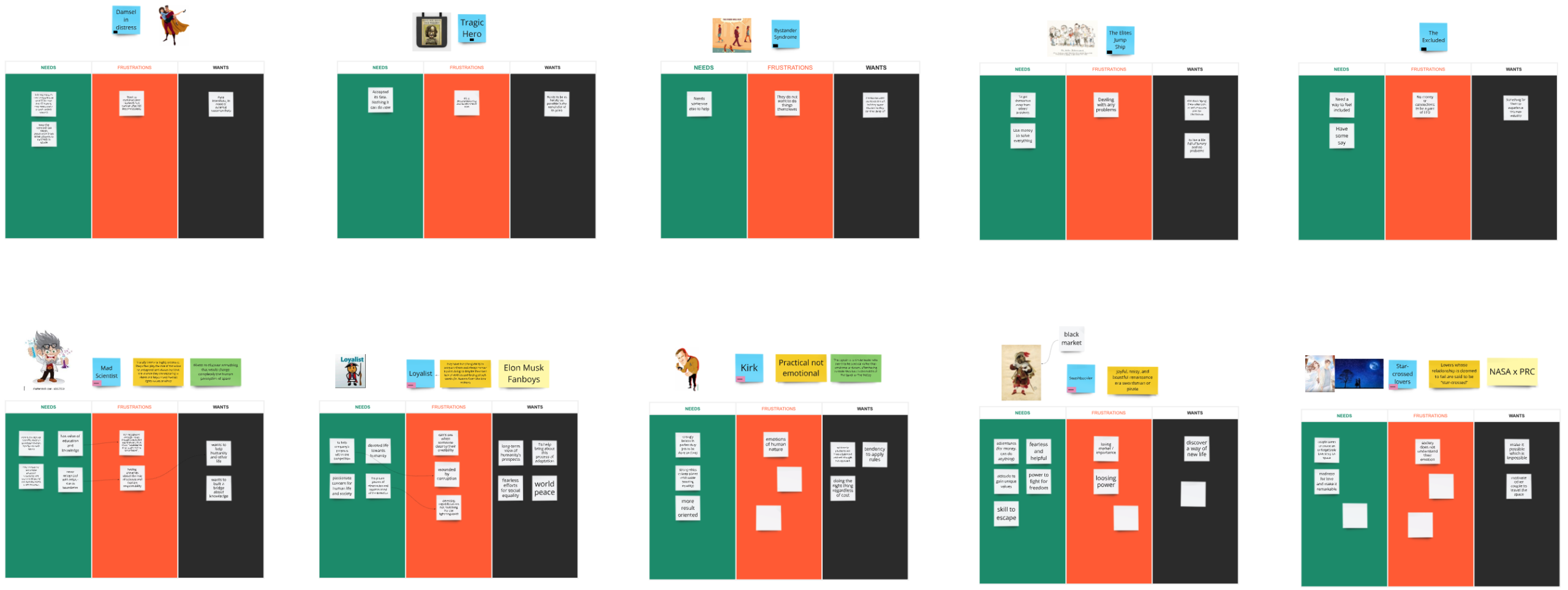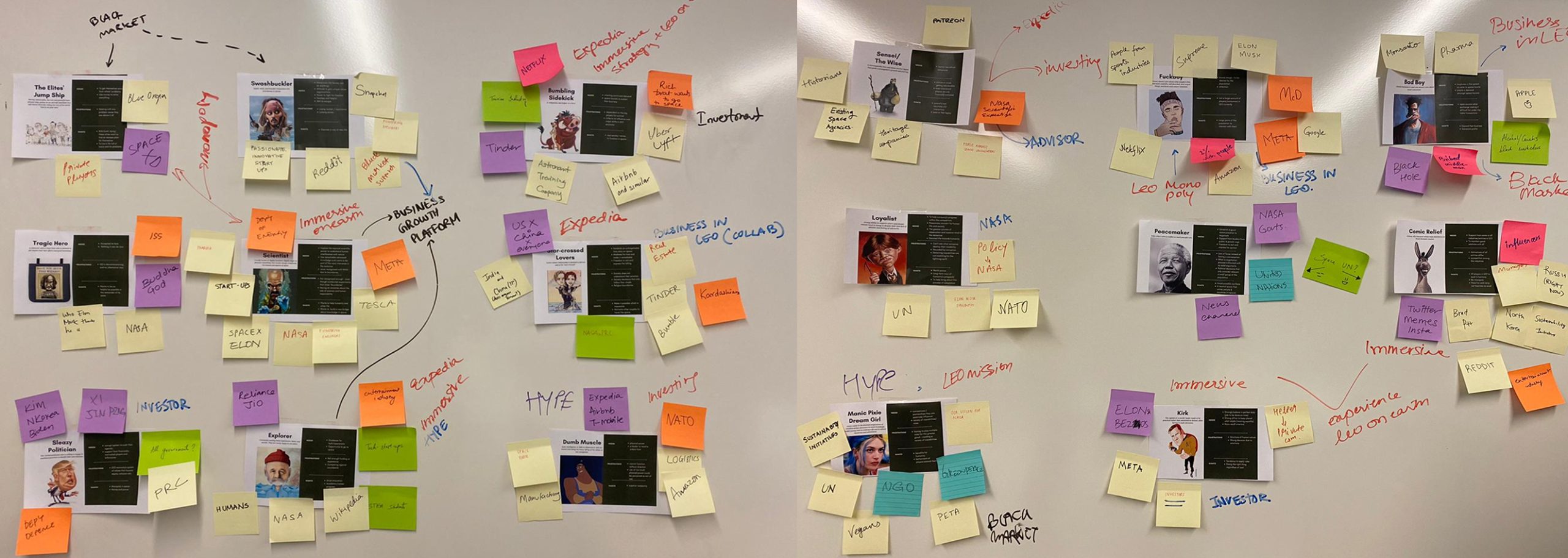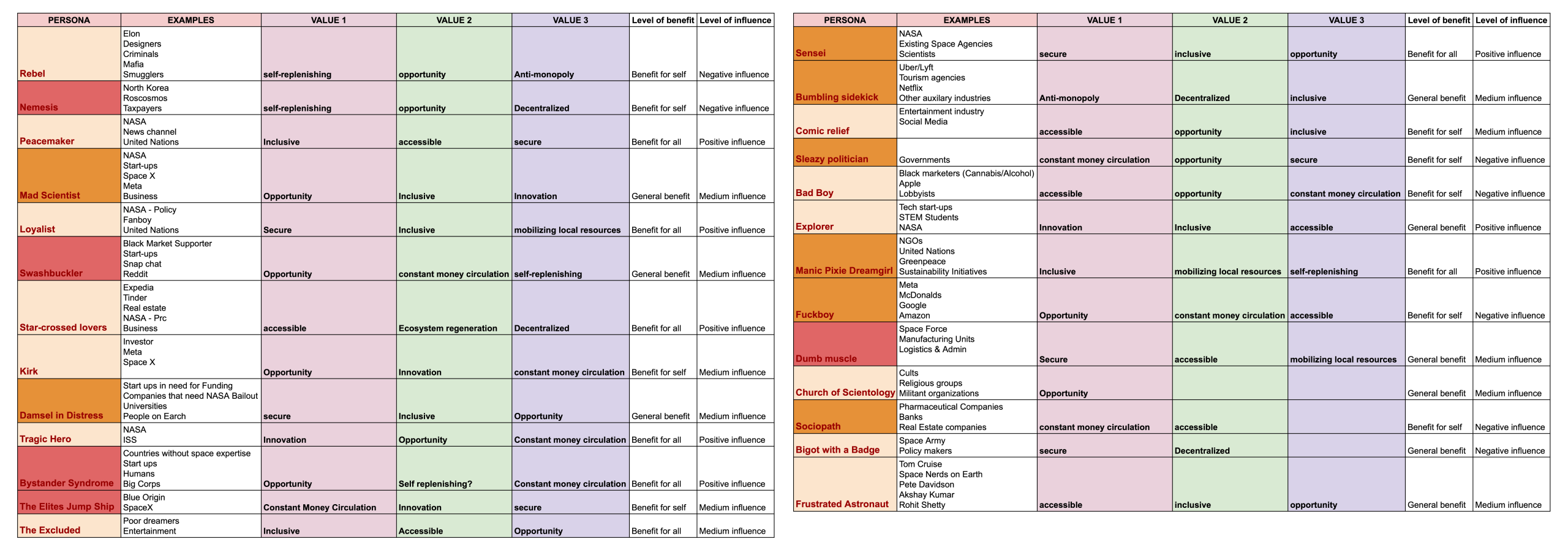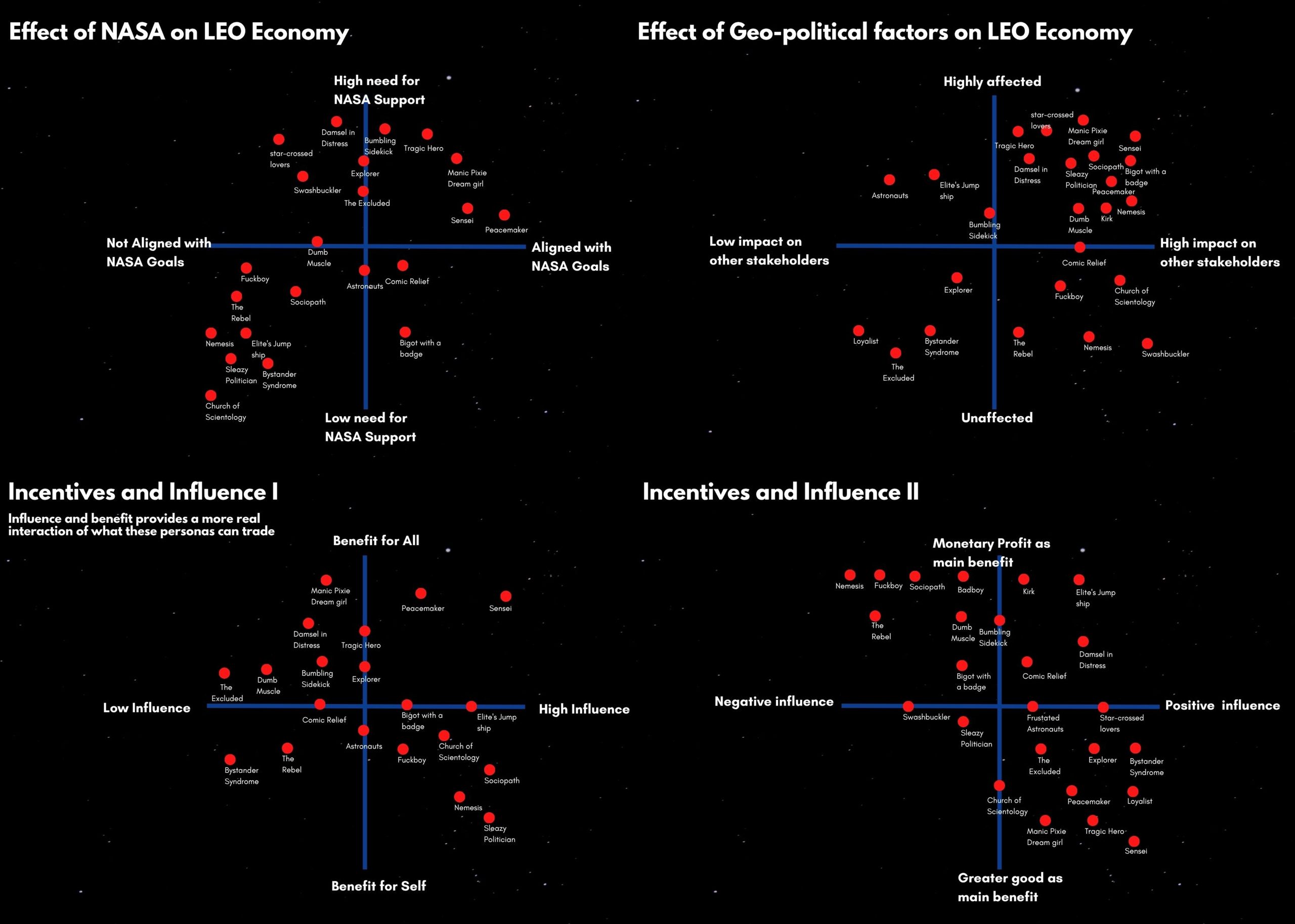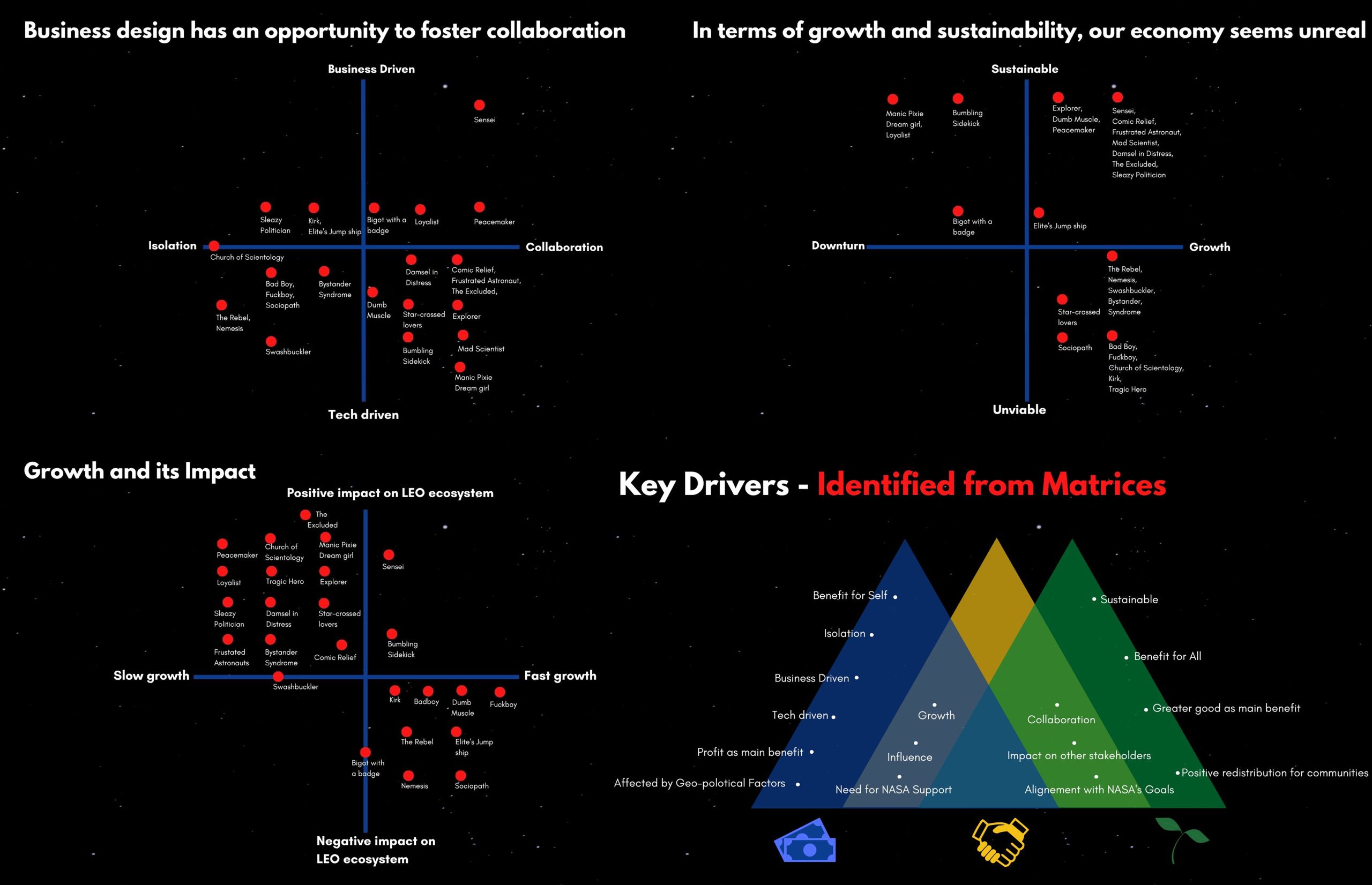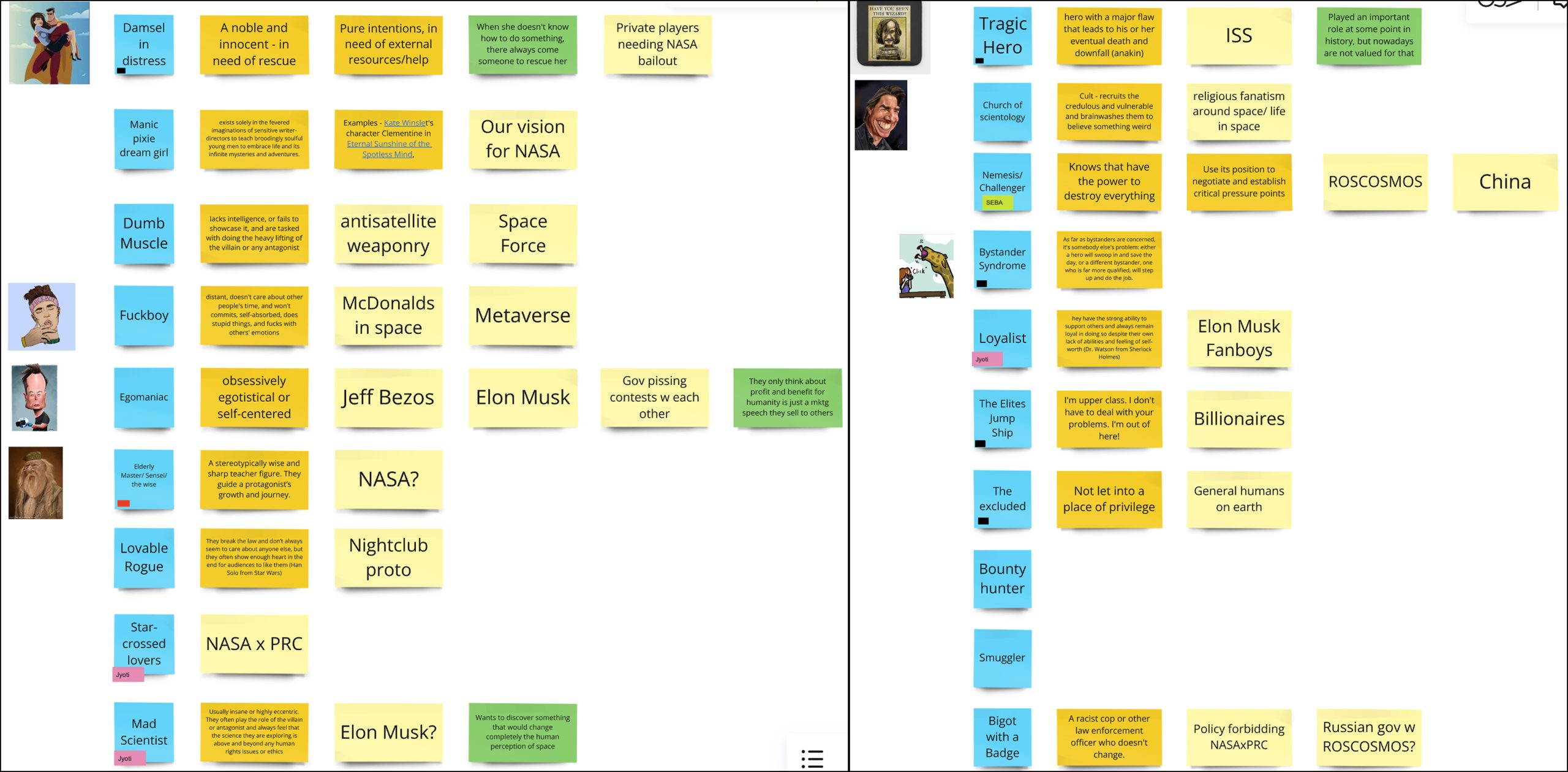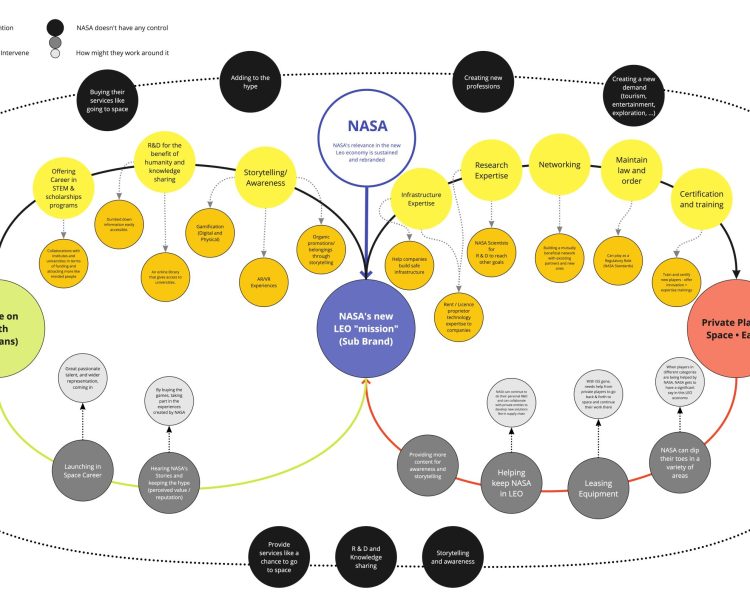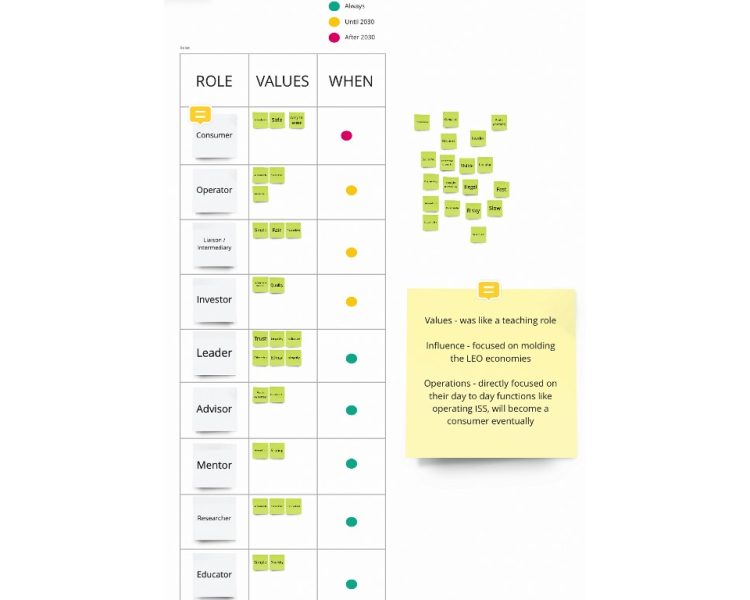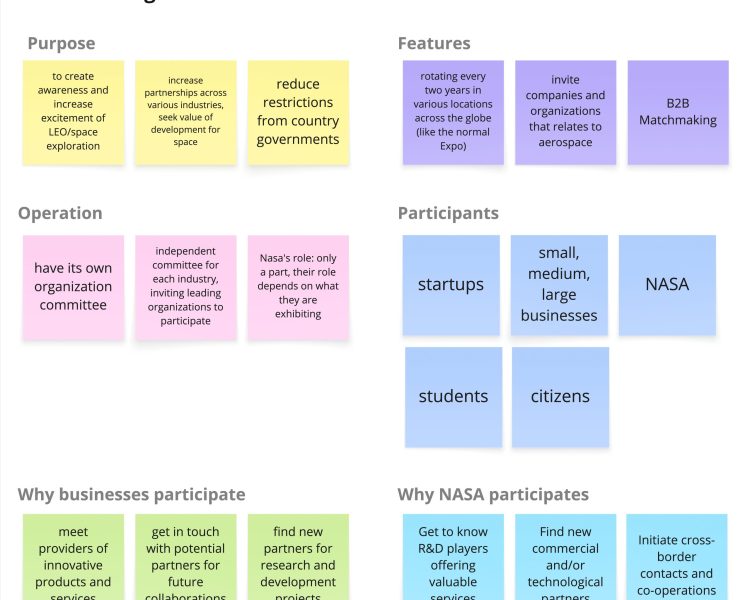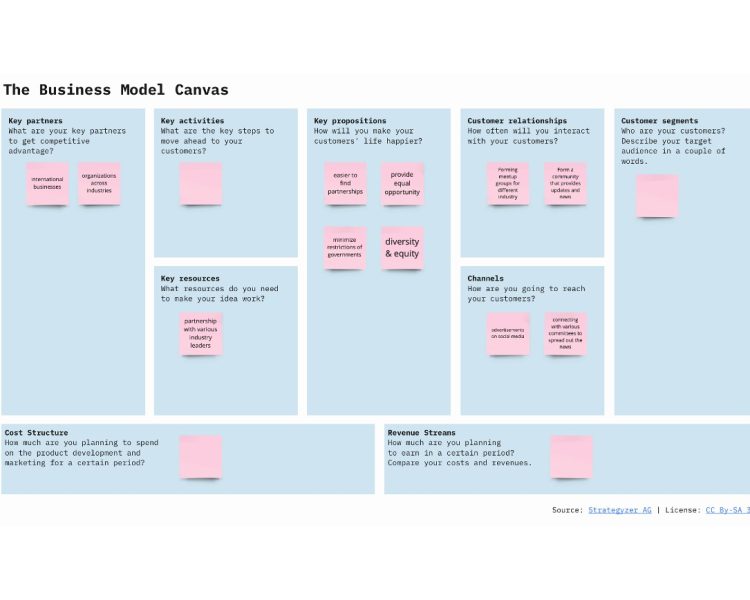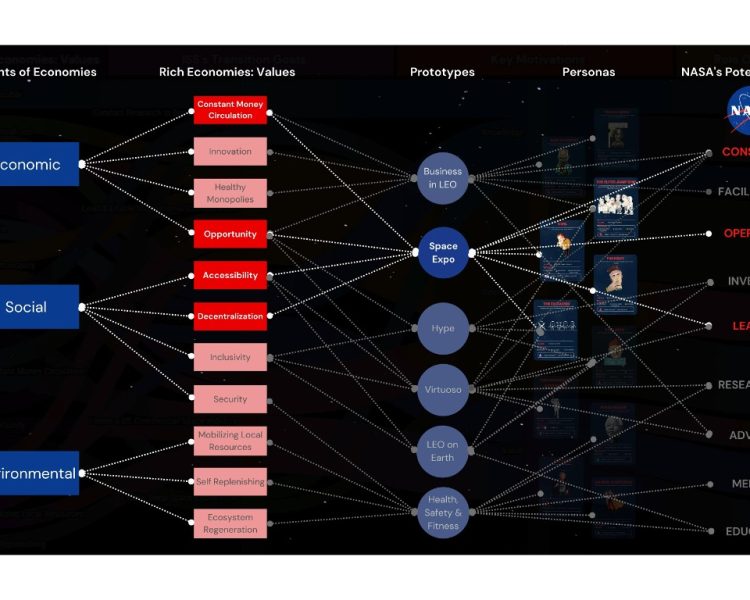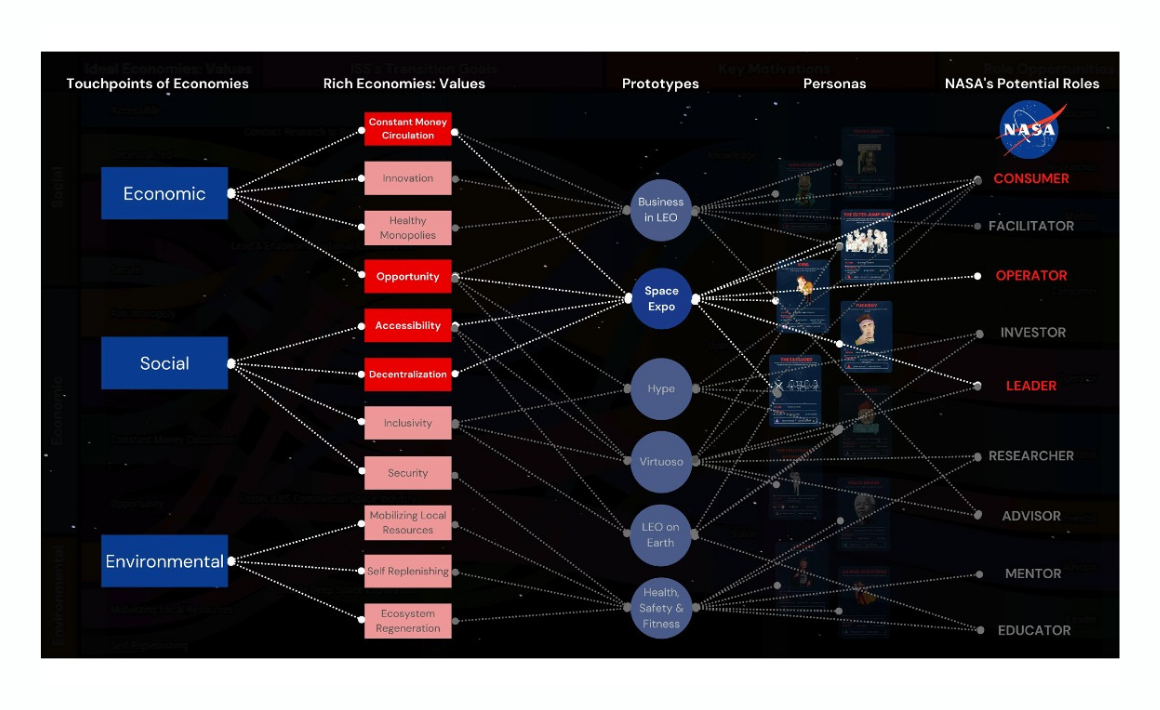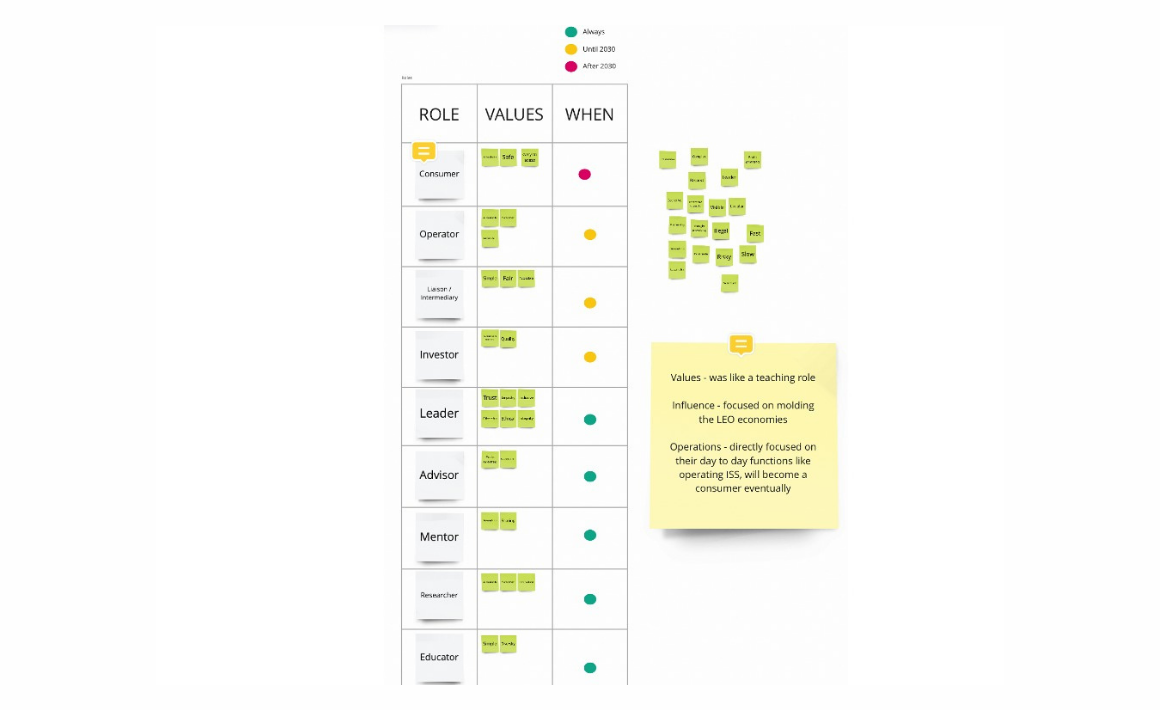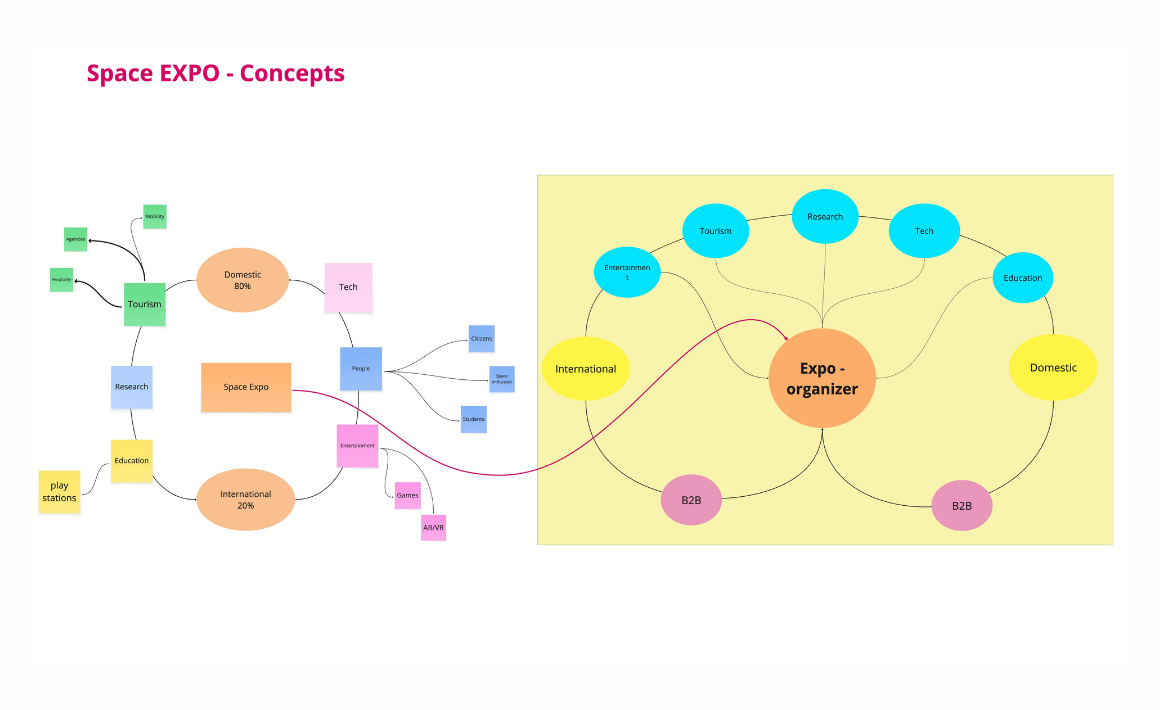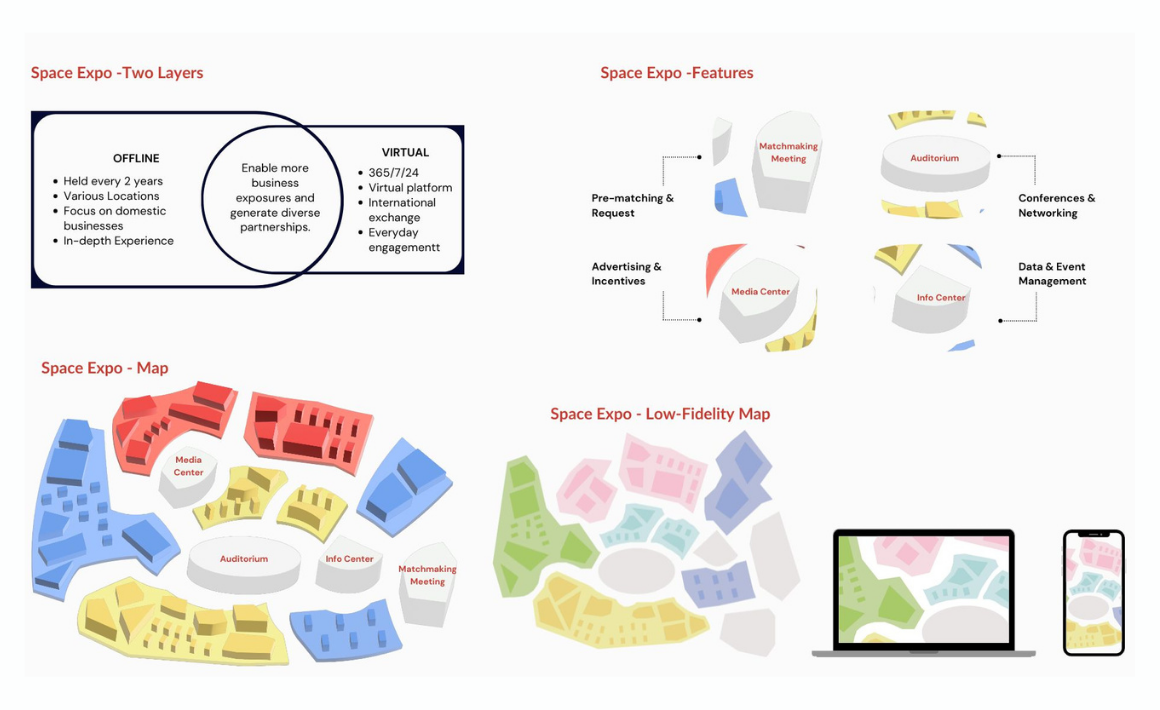Jyoti Sondagar | Designer, Researcher, Strategist based in New York

Design research | Speculative design | Data visualization
Space Expo - A Strategic Platform for Business Growth and Networking in Low Earth Orbit (LEO)
Role
User Researcher, Strategist, Storyteller
Duration
15 Weeks
Methods
User Research, Stakeholder interviews, Stakeholder maps, Strategy development, SWOT analysis, Persona development, Visual Design, Ideation workshops, Prototyping, Presentation with NASA
Tools
Figma, Photoshop, InDesign, Illustrator, Google Suite
the challenge
How is the emerging Low-Earth Orbit (LEO) economy developing, and what role will NASA play in it?
NASA has announced its plan to de-orbit ISS from LEO in 2030.
For over 21 years, NASA has been playing a leading role in LEO. As it transitions to becoming one of many customers in an emerging commercial LEO marketplace, NASA aims to maintain its presence.
With increasing participation from both public and private entities entering the LEO, the key question is: how can NASA lead in shaping the emerging LEO economy while leveraging strategic partnerships to maximize mutual benefit?
the strategy
A strategy to establish a strong platform that positions NASA as a leading force in the development of a robust space economy.
During this Integrated Studio at Parsons, we researched space strategic development, identified key challenges and opportunities, and proposed the concept of the development of a multi-economy model for space. We have developed various strategies and prototypes, aiming to implement groundbreaking strategies for a sustainable future in space exploration, with NASA’s leadership in the evolving space economy.
This prototype – Space Expo, was one such notable prototype. Space Expo is a platform that provides useful information, learning resources, and networking opportunities. It helps startups and businesses grow while building global partnerships.
overview
NASA plans to DE-orbit the ISS from Low-Earth Orbit (LEO) in 2030.
NASA’s aim to be one of many customers in a robust commercial LEO marketplace, where cargo, crew transport, and destination are available as services.
As the commercial space age rapidly expands, with Morgan Stanley forecasting space exploration as the next trillion-dollar industry, NASA is reevaluating its role in this evolving landscape. This will allow NASA to buy the services it needs from commercial companies for micro gravity research and technology demonstrations while the agency explores the Moon and Mars. Hence, we have asked ourselves the question:
What is the new LEO economy, and what is NASA’s role within it?
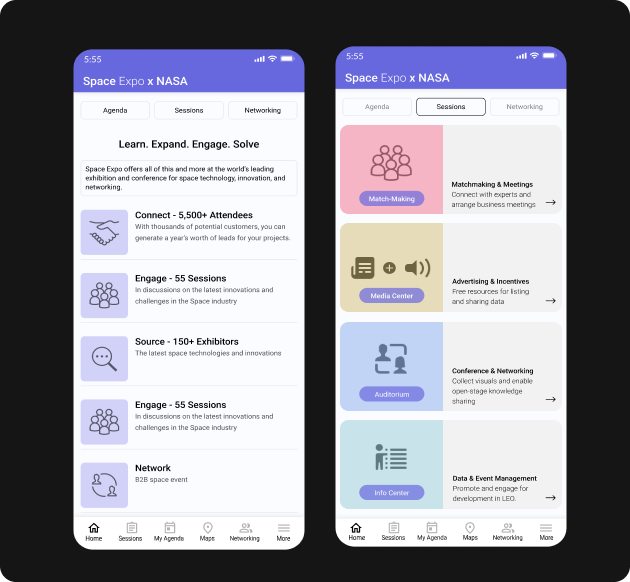
understanding the challenge
Following in-depth collaboration with the NASA team, we uncovered critical challenges and strategic opportunities to support the expansion of the Low Earth Orbit Economy. Using a design thinking framework, we carried out extensive research and analysis to deeply understand NASA’s future vision and long-term objectives.

discover
Understanding the emerging Lower Earth Orbit (LEO) economy and evaluated NASA’s goals and role and influence.

define
Envisioning the ideal LEO economy, what would sustainable commerce and successful partnerships in space look like? What strategies could advance NASA's goals?

Develop
Developing prototypes supporting NASA, space industry growth, humanity on Earth, and deep space exploration.

deliver
We presented a series of strategic design prototypes to NASA experts, and received appreciation along with valuable feedback.
research
After the project start, we defined our research strategy and objectives, prioritizing an in-depth understanding of needs and challenges.
- Problem Space
To obtain a comprehensive understanding of the Lower Earth Orbit (LEO) Economy ecosystem, along with a thorough assessment of the significance and functionalities of NASA’s International Space Station (ISS), our approach to design research is launched with the goal of identifying significant opportunities for our collaborative partner on a consequential scale.
Secondary Research
We conducted extensive literature reviews, meticulously analyzing official documents such as the “Forecasting Future NASA Demand in Low Earth Orbit” white paper, the “International Space Station Transition Report,” and NASA’s Plan for Commercial LEO Development.
Primary Research
We engaged in in-depth interviews with three NASA employees who served as key representatives of the subject matter stakeholders.
3-4 Participants
NASA’s current Goals: ISS Transition Report
Conduct Research to benefiting humanity
Inspire Humankind
Enable deep space exploration
Lead and enable International Collaboration
Foster the US Commercial Space Industry
- Problem Space
Identifying Gaps & Opportunities
We addressed gaps in NASA’s way of thinking as well as gaps between the current LEO economy and the ideal future state LEO economies that present unique opportunities:
Gaps
Partnerships, models and the LEO economy are being thought about separately
The LEO economy is being thought of as one economy
The LEO economy is being thought about primarily from the standpoint of the Space Tech industry
ISS’ future presence & role in LEO is being thought about as both its physical presence on CLDs, as well as the LEO and deep space SME
Opportunities
- The LEO economy can be anchored in (various) ideal economic models; Partnerships are a part of a greater whole (LEO economy)
- The LEO economy can be expanded into multiple economies, formal and informal in nature
- The LEO economies must include various horizontal and vertical industries to ensure their long term survival
- There is potential for ISS to play an even bigger role by tapping into the ISS' (and NASA's) broader "soft" and "hard" powers
- Problem Reframing
Reframing the Brief
In response to gaps identified in NASA’s approach and the current LEO economy, we have embarked on a transformative path to redefine the project scope and establish new focus areas. By acknowledging the differences between the present and the envisioned future of LEO economies, we are committed to tackling these challenges and driving meaningful solutions.
The ORIGINAL Brief
The International Space Station (ISS) recently celebrated its 20th year of hosting humans continuously in space, and the ISS is potentially being extended to 2030. The PRC now has a space station, and private companies are now consistently going to LEO.
What is the future of LEO and NASA? What are new models and partnerships for the future?
A new era of LEO is upon us. How do we shape it?
The REDEFINED Brief
- What is the new LEO economy, and what is NASA's role within it?
- Define
Aligning the Economics of Low-Earth Orbit (LEO) with NASA’s goals.
What would the ideal Low-Earth Orbit (LEO) economy look like with sustainable commerce and successful partnerships in space?
a). What strategies could help NASA achieve its goals in this emerging environment?
b). Do we want to replicate in LEO what is happening down on Earth?
c). Can a singular economy meet the needs of the diverse interacting players and entities in LEO?
d). How can these economies represent features and values that can collectively generate new ways in which actors in LEO can interact?

- Persona - Identifying Drivers
Prioritizing personas based on their key drivers and attributes
Develop
Concept Development
In response to the dominance of aerospace giants like SpaceX, Blue Origin, and Virgin Galactic, I identified a critical gap: the lack of visibility and access for smaller businesses and startups in the Low Earth Orbit (LEO) economy. To address this, I conceptualized the Space Expo – a strategic platform designed to elevate emerging innovators in the space sector.
The Expo supports exposure, collaboration, and knowledge exchange, enabling startups to showcase breakthrough technologies, build industry connections, and participate meaningfully in the evolving LEO ecosystem. By empowering underrepresented players, the Space Expo drives inclusive growth, catalyzes partnerships, and helps shape a more dynamic and equitable aerospace future.
- The Prototype
The Space Expo drives growth in the Low Earth Orbit (LEO) ecosystem by helping startups and small businesses connect, share ideas, and collaborate in the aerospace industry.
Space Expo by NASA 
Powered by NASA – Driving innovation and building partnerships in the growing Low Earth Orbit (LEO) economy.
Strategic Platform in space exploration for business exposure, build global partnerships, and lead in Low Earth Orbit (LEO) economies.
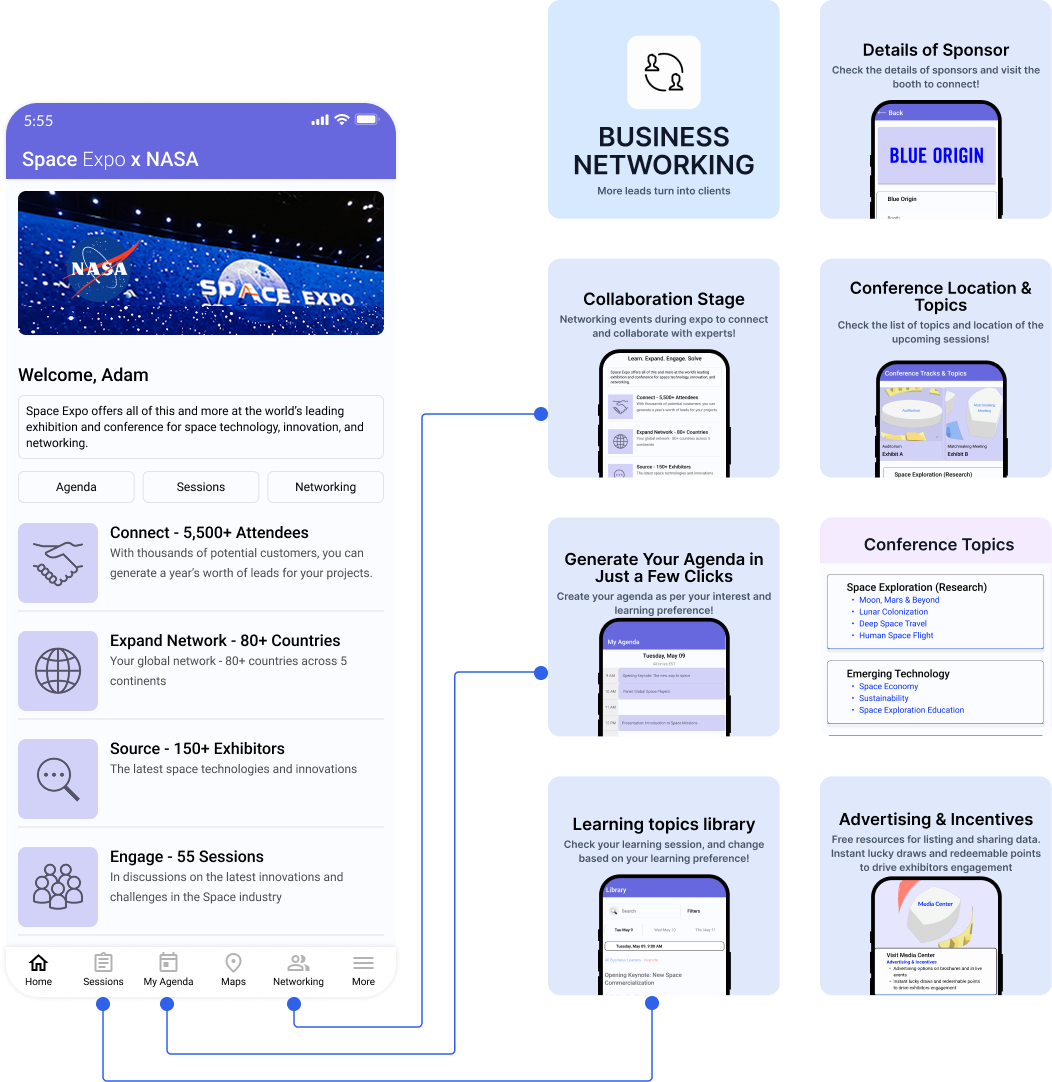
- Features
Connect with an expert and arrange business meetings
Free resources for listing and sharing data
Promote and engage for development in LEO.
Promote and engage for development in LEO.
Matchmaking & Meetings
- AI driven pre-matching
- Matchmaking by request
Advertising & Incentives
- Advertising options on brochures and in live events
- Instant lucky draws and redeemable points to drive exhibitors engagement
Data & Event Management
- Event organizer analytics and reporting
- Unique backends for exhibitors
- Review and export business data
- All appointment chat data collected
Conference & Networking
- Live and pre-recorded conference sessions
- Sponsored presentation videos for exhibitors and other event partners
- Open stage knowledge sharing
deliver
To address this gap, I developed the concept of a Space Expo – a platform for businesses and startups to showcase the innovations, products, and services within the space exploration industry.
Through this Expo, the aim is to create opportunities for diverse companies to connect, collaborate, and grow their presence in the space industry.
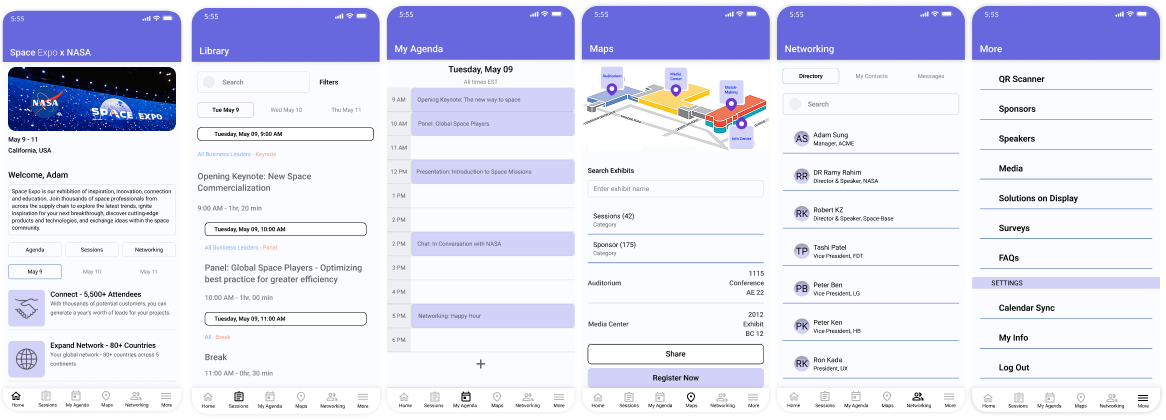
NASA’s Role in Space Expo
- NASA plays a leadership role by connecting business leaders and provide roadmap for businesses in LEO
- NASA experts offer consultation to businesses seeking to expand their presence in LEO.
- NASA can create a new partnership with businesses and provide more opportunities across the globe.
key takeaway
Working with NASA on this project was a career-defining experience. It was both thrilling and challenging, leading to remarkable personal and professional growth. I honed my research, communication, teamwork, and adaptability skills, and the complexity of designing for space economies sharpened my systemic thinking.
I believe in collaboration and open communication, working closely to “Designing experiences where every vision comes alive.”

